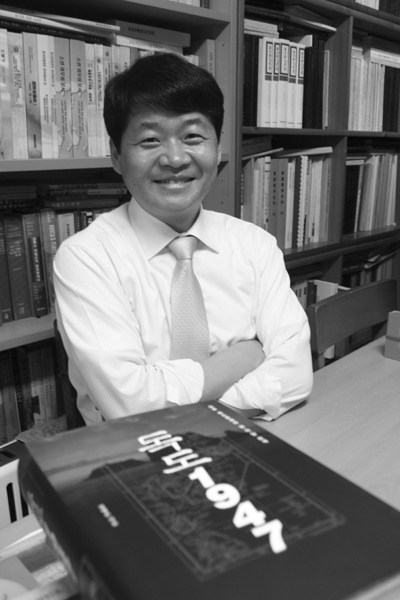
“Textbook education is influential and closely connected to the creation of values,” professor Jung Byung-joon (History) said. “Citizens will be educated accordingly, which is worrisome. I predict that in five to 10 years, the tensions over the territory will heighten.”
Professor Jung is the winner of Wolbong Korean Studies Award 2011 for his book “Dokdo 1947” which presents an analytical perspective on the Dokdo dispute based on the San Francisco Peace Treaty (SFPT) in 1951. The Wolbong Korean Studies Award is bestowed annually in recognition of Korean history preservation. The award was established in 1979 in tribute to Wolbong Han Gi-hak, the Korean independence activist.
Professor Jung’s argument in his book over the territorial issue of Dokdo differs from other scholars’ perspectives. He understands the problem as the remnant of a power struggle between the United States, the Soviet Union and Japan.
“Confirmation of ownership does not require a search for ancient historical evidences because Japan’s claim over the islets dates back to San Francisco Peace Treaty,” prfoessor Jung said.
The treaty was ratified between the allied powers and Japan to officially end World War II. The treaty served to disqualify Japan’s position as an imperial power and to allocate compensation to allied civilians.
However, Korea and China the evident victims of Japan’s regime, were excluded from the treaty. China was facing Chinese Civil War and the controversy over the legitimacy of the government. Korea was in the middle of the Korean War.
“The role of the United States was crucial in the process of assigning the sovereignty of colonized territories and in handling war crime compensations. However, the United States needed Japanese support in the Northeast Asian region for the containment of the Soviet Union,” professor Jung said.
Professor Jung also added that in the document approving the independence of Korea from Japanese colonization, the islet Dokdo was dismissed. “China and Korea’s failure to participate in the SFPT has entailed territorial disputes with Japan till this day.”
Diaoyu islands, also known as the Senkaku islands in Japan, are a group of uninhabited islands in the East China Sea. Japan controlled these islands from 1895 until surrender at the end of World War II. The sovereignty of the islands, like Dokdo, is controversial because the SFPT failed to distinctively address their independence from Japan.
Professor Jung believes that Koreans need to be less emotional in handling Dokdo issues. “Territorial dispute over Dokdo is not an issue that can be readily solved,” professor Jung said.
“It has been a long historical dispute and will continue to be. Thus, cooperation and balance among the government, academic scholars, non-governmental organizations and citizens are necessary in unraveling the issue.”
To this territorial dispute, students show different reactions. “Japanese students do not consider Dakeshima (Japanese word of Dokdo) as significantly as Koreans do,” Yoko Onodera (International Studies, 4) said. “I believe that it is an overheated debate only on the Korean Peninsula, but I think Dakeshima is Japanese territory,” Onodera said.
However, different responses can be heard from Korean students. “I think it is still a debatable and ongoing issue, so the Japanese shouldn’t have acted so decisively on the matter by writing it in textbooks,” Kang Na-yeon (International Studies, 2) said.
Controversy over land sovereignty is worldwide. The matter is not just geographical but deeply related to the politics, economy, and culture of the adjacent nations. It is historians’ role to prove history with findings and materials. However, interpretation of materials may differ from one historian to the other.
“I hope Ewha students have pride in studying Korean history. Students who know the history will have broader view on Korea,” professor Jung said.
Lee Ji-hyun
jihyune2@ewhain.net

